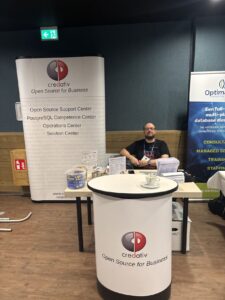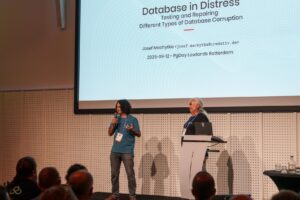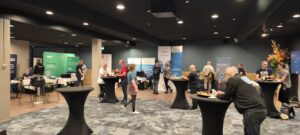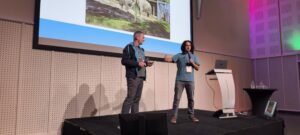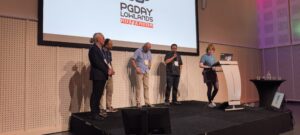Elephant in Oceanium: Insights from PGDay Lowlands 2025
| Categories: | Events PostgreSQL® |
|---|---|
| Tags: | PGDay |
On Friday, September 12th, we attended PGDay Lowlands 2025 in Rotterdam and it was definitely a conference to remember. It took place at the Blijdorp Zoo in Rotterdam, in the Oceanium building. It was an unforgettable experience to discuss databases while surrounded by various fish, sharks, and rays. Our company credativ GmbH, as an enterprise-grade open-source support provider for PostgreSQL, was a sponsor of the event and we had a booth there to meet attendees. Our CTO Alexander Wirt and our PostgreSQL expert Joop Boonen met visitors on our booth and discussed with them many technical aspects of PostgreSQL.
My Talk about Database Corruption
I represented our company also as a speaker, giving a talk titled “Database in Distress: Testing and Repairing Different Types of Database Corruption.” This talk summarized my experiences with database corruption. I’ve seen many corruption issues while repairing live systems. So I built a Python corruption simulator, which surgically damages selected parts of a data block in a testing table, and I used different PostgreSQL extensions to analyze these cases. The talk walked through examples of page-level corruption and discussed strategies for recovery. At the end of my talk, I discussed potential new Postgres features or settings that could make repairs less painful in the future. After the talk, many attendees came to our booth to discuss their experiences with specific corruption cases, which also sparked greater interest in credativ’s services.
Other Talks and Highlights
- Opening remarks – Boriss Mejias, as the organizer and guide, opened the conference by emphasizing the value of the community around PostgreSQL. Personally,
- Jimmy Angelakos – “How Do We Get Postgres to the Next Level?”
This talk was inspired by the one given by Simon Riggs in December 2023 in Prague. Jimmy offered different insights to keep improving PostgreSQL by making it more modular, boosting test coverage, creating a team specialized only in performance issues, and adding some new cutting-edge features. In particular, he mentioned goals like 100% regression testing, online major-version upgrades, and optional multi-threading – all part of a roadmap to solidify PostgreSQL’s lead. - Gulçin Yıldırım Jelinek – “Anatomy of Table-Level Locks in PostgreSQL”
This was an intermediate deep dive into DDL locks: explaining Access Share, Exclusive, Access Exclusive locks, and how they queue during ALTER or DROP commands. She showed how to interpret lock waits and deadlocks, and shared practical tips (like using online schema-change tools) to achieve near-zero downtime during migrations. - Chris Ellis – “Fun With UUIDs“
I very much enjoyed this talk. UUIDs have a bad reputation, mostly because randomly allocated UUIDs negatively affect indexes. But UUIDs also give us 16 bytes of space to play with, which can be to our advantage. Chris showed how to use the space of UUIDs to structure and encode data within identifiers to distinguish tenants, shards, or partitions. - Johannes Paul – “Actual trees, not b-trees – how I found PostgreSQL through PostGIS”
Speaker charmed the auditorium with the story of a neighbor’s climate-monitoring project mapping real-life tree data across Germany. Because he needed efficient geographic searches, Johannes switched to using PostGIS on PostgreSQL for his web app. - Dirk Krautschick – “Beyond Postgres – Insights about the PostgreSQL Extensibility”
Dirk emphasized that Postgres is designed to be lightweight yet powerful via extensions. He explained the extension framework and sketched out how to write a new extension for extra functionality. - Andreas Scherbaum – “What I learned interviewing the PostgreSQL Community”
I enormously enjoyed this talk . Andreas has been running the postgresql.life interview series and distilled some fun stats from them. It was a charming “state of the community” talk with interesting charts and quotes. - The final debate on “Autotuning in Postgres” was also very interesting. The PRO side (Luigi Nardi, Gianni Ciolli) argued that autotuning tools can save DBAs hours of manual work. But the CON side (Mayuresh S. Bagayatkar, Guy Gyles) countered that blindly auto-changing settings might over-tune and even hurt performance, since machines lack the human context for every deployment and current AI has no concept of truth.
Reflections
PGDay Lowlands 2025 was a fantastic experience. The mix of deep technical content and the relaxed zoo setting made for a friendly, engaging atmosphere. It was great to meet so many users and contributors and to hear about real-world problems, and even pick up new ideas for future work. I’m proud that credativ could play a role in such a great community event. PostgreSQL continues to grow and evolve, with people thinking hard about different issues, from locks and extensions to automatic tuning, and the community’s energy is truly inspiring. We are already looking forward to PGDay Lowlands 2026!
| Categories: | Events PostgreSQL® |
|---|---|
| Tags: | PGDay |

